CORPORATE ACTION
REPUTATIONAL RISK FOR BIG PLASTIC: Report Exposes How Corporations Divert Attention, Continue Plastic Pollution
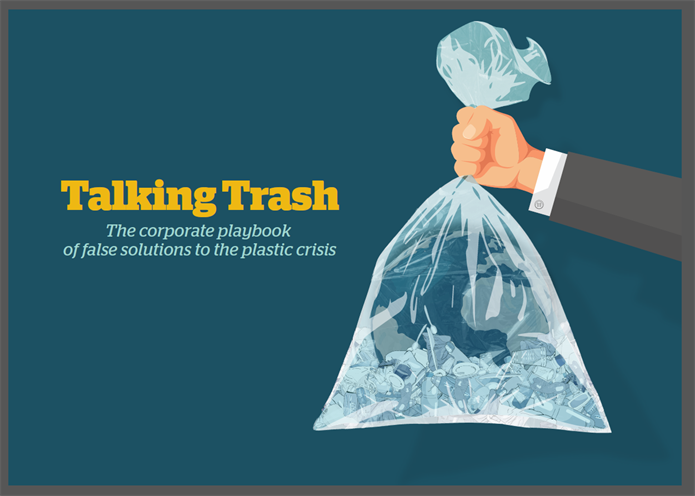 A well-organized network of organizations is fighting plastic pollution solutions using similar ploys around the world, according to “Talking Trash: The Corporate Playbook of False Solutions,” a report from The Changing Markets Foundation. The 98-page report looks at actions by the top 10 plastic polluters as well leading NGOs and trade bodies, looking at them over time and across regions and countries.
A well-organized network of organizations is fighting plastic pollution solutions using similar ploys around the world, according to “Talking Trash: The Corporate Playbook of False Solutions,” a report from The Changing Markets Foundation. The 98-page report looks at actions by the top 10 plastic polluters as well leading NGOs and trade bodies, looking at them over time and across regions and countries.It highlights how these strategies are used to distract consumers and governments and “delay and derail legislation” that might prevent them from growing the market for cheap, disposable plastic packaging.
None of the companies analysed – Coca-Cola, Colgate-Palmolive, Danone, Mars, Mondelēz, Nestlé, PepsiCo, Perfetti Van Melle, P&G and Unilever – come out well. Parallels with the actions of Big Tobacco are strong and the report exposes the reputational risk they face.
Across the ten, authors seediffering levels of commitment, from near zero (Perfetti Van Melle and Mondelēz International) to more impressive-sounding commitments (Unilever, Danone and Coca-Cola), but even the better ones fail to provide sufficient transparency and often act in unethical ways.
A study of Coca-Cola shows three decades of broken promises to reduce plastic use: it made in 1990 a commitment to make bottles with 25% recycled polyethylene terephthalate (rPET), but today rPET content is still only about 10%. Also, the company pledged to support 10 voluntary initiatives to solve plastic waste while being a member of at least seven trade associations that lobbied against legislation and policies seeking to prevent plastic pollution.
The authors also criticize many trade bodies that work on behalf of the companies as well as NGOs that run voluntary commitments, such as New Plastic Economy, for lacking accountability and transparency and often greenwashing companies.
Last, the report points to proven solutions – reuse and refill along with mechanical recycling – and criticizes reliance on unproven technologies such as chemical recycling that are distant from being commercially viable and come with serious environmental detriments.[Image Credit: © The Changing Markets Foundation]
CORPORATE ACTION: Coca-Cola
Coca-Cola Commits To Furthering Goals Of New Climate Change Roadmap
Coca-Cola has endorsed the goals of new climate change roadmap from the Ceres Company Network that stresses the importance of setting science-based corporate strategies to address climate change. Roadmap 2030 urges companies to commit to achieving net-zero emissions by 2040; achieve resource positivity across key commodities by 2030; reach water balance in watersheds of high-water stress; and enable a just and inclusive transition. An example of Coca-Cola’s commitment to the goals is a partnership between Coca-Cola Beverages Philippines and Indorama Ventures to build a "bottle to bottle" recycling plant that can process two billion bottles annually.
All Coca-Cola European Partners Bottles Now Made With 50 Percent rPET
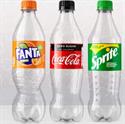
The multinational bottler has partnered with Coca-Cola Great Britain is manufacturing all plastic bottles across its core brands with 50 percent recycled plastic (rPET) – more than 21,000 tons of recycled plastic per year. Labels on the bottles will inform customers of the change and encouraging them to recycle the bottle under a Deposit Return Scheme that is coupled with investment in infrastructure. According to the company, there isn’t enough food-grade recycled plastic available in the U.K. to switch to 100 percent rPET across its entire range. [Image Credit: © Coca-Cola European Partners]
CORPORATE ACTION: Danone
Evian Says All Of Its Bottles In The U.K. Are Made From Recycled Plastic

The French mineral water brand announced that the new bottles will be widely available in the U.K. beginning September 21, the first day of Recycle Week. Evian bottles were already 100 percent recyclable, but are also now made from 100 percent recycled plastic. An Evian marketing exec said the company is committed to providing “our iconic Evian water in a way that limits the use of virgin plastic.”[Image Credit: © Danone S.A.]
CORPORATE ACTION: Lidl
Lidl GB Plans To Reduce Plastic Packaging, Waste By 40% By 2025
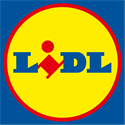 Lidl GB said it will reduce by 40% the plastic packaging for its own-label products and cut the total amount of own-label packaging by 25% by 2025. It announced other plastic reduction goals, including doubling the number of refillable and reusable packaging options available in-store by 2021; achieving 100% recyclable, reusable, refillable, or renewable own-label packaging and branded packaging by 2025; and 50% of own-label packaging made of recycled content by 2025. It also pledged that 100% of pulp and fibre-based own-label packaging for its core food range will be responsibly sourced or made with recycled content by January 2021.[Image Credit: © Lidl]
Lidl GB said it will reduce by 40% the plastic packaging for its own-label products and cut the total amount of own-label packaging by 25% by 2025. It announced other plastic reduction goals, including doubling the number of refillable and reusable packaging options available in-store by 2021; achieving 100% recyclable, reusable, refillable, or renewable own-label packaging and branded packaging by 2025; and 50% of own-label packaging made of recycled content by 2025. It also pledged that 100% of pulp and fibre-based own-label packaging for its core food range will be responsibly sourced or made with recycled content by January 2021.[Image Credit: © Lidl]
CORPORATE ACTION: Nestlé
Nestlé Waters U.K. Advances Plan For Circular Plastics Economy
 The Gatwick-based bottled water company has partnered with recycler Biffa in a program to collect recyclable PET bottles and reprocess them in the U.K. into rPET bottles. The partnership supports Nestlé Waters’ aim to collect as many bottles as it produces globally by 2030, enabling the company to significantly reduce the amount of virgin plastic it uses under its global commitment to reduce the use of virgin plastics by one third by 2025. Every BUXTON bottle will be made from 100 percent recycled rPET (recycled polyethylene terephthalate, by collecting recyclable PET bottles and reprocessing them here in the UK into rPET. Biffa has set a target to quadruple its plastic recycling by 2030, and the rPET supplied to Nestle Waters will come from the company’s new £27.5 million ($35 million) state-of-the-art plastic recycling facility in Seaham, County Durham. The plant has the capacity to process the equivalent of 1.3 billion plastic bottles a year and will supply recycled material to Nestle Waters Buxton factory beginning in 2021.[Image Credit: © 2020 Nestlé Waters]
The Gatwick-based bottled water company has partnered with recycler Biffa in a program to collect recyclable PET bottles and reprocess them in the U.K. into rPET bottles. The partnership supports Nestlé Waters’ aim to collect as many bottles as it produces globally by 2030, enabling the company to significantly reduce the amount of virgin plastic it uses under its global commitment to reduce the use of virgin plastics by one third by 2025. Every BUXTON bottle will be made from 100 percent recycled rPET (recycled polyethylene terephthalate, by collecting recyclable PET bottles and reprocessing them here in the UK into rPET. Biffa has set a target to quadruple its plastic recycling by 2030, and the rPET supplied to Nestle Waters will come from the company’s new £27.5 million ($35 million) state-of-the-art plastic recycling facility in Seaham, County Durham. The plant has the capacity to process the equivalent of 1.3 billion plastic bottles a year and will supply recycled material to Nestle Waters Buxton factory beginning in 2021.[Image Credit: © 2020 Nestlé Waters]
Nespresso Commits To Full Carbon Neutrality By 2022 Across Its Entire Supply Chain
 The Nestlé (Lausanne, Switzerland) brand of capsule coffees and coffee makers has pledged that every cup of Nespresso coffee for at-home and professional customers will be carbon neutral by 2022. The company has been carbon neutral across its business operations since 2017, and the new commitment will tackle emissions that occur in its supply chain and product life cycle. The goal will be achieved by: the reduction of carbon emission; the planting of trees in and around coffee farms where Nespresso sources its coffee (insetting); and through support, and investment in high quality offsetting projects. Nespresso said a broader sustainability program to be announced later this year that will: preserve exceptional coffees, build a resilient and regenerative coffee agriculture system, drive sustainable livelihoods for farmers and build a circular business.[Image Credit: © Nestlé Nespresso SA]
The Nestlé (Lausanne, Switzerland) brand of capsule coffees and coffee makers has pledged that every cup of Nespresso coffee for at-home and professional customers will be carbon neutral by 2022. The company has been carbon neutral across its business operations since 2017, and the new commitment will tackle emissions that occur in its supply chain and product life cycle. The goal will be achieved by: the reduction of carbon emission; the planting of trees in and around coffee farms where Nespresso sources its coffee (insetting); and through support, and investment in high quality offsetting projects. Nespresso said a broader sustainability program to be announced later this year that will: preserve exceptional coffees, build a resilient and regenerative coffee agriculture system, drive sustainable livelihoods for farmers and build a circular business.[Image Credit: © Nestlé Nespresso SA]
CORPORATE ACTION: Procter & Gamble
P&G Beauty Joins With JD To Launch Plastic Bottle Recycling Program In China
 P&G Beauty partnered with ecommerce company JD to launch a plastic bottle recycling program in China. The program will let customers in Shanghai and Guangzhou who purchase P&G Beauty’s hair care products from Head & Shoulders, Pantene, VS Sassoon, and other company brands receive the products in JD’s reusable “green box” containers. Customers can then put used plastic bottles in the box, which is then collected by JD couriers. P&G will recycle the plastic bottles into artificial grass lawn playgrounds for schools.[Image Credit: © Proctor & Gamble]
P&G Beauty partnered with ecommerce company JD to launch a plastic bottle recycling program in China. The program will let customers in Shanghai and Guangzhou who purchase P&G Beauty’s hair care products from Head & Shoulders, Pantene, VS Sassoon, and other company brands receive the products in JD’s reusable “green box” containers. Customers can then put used plastic bottles in the box, which is then collected by JD couriers. P&G will recycle the plastic bottles into artificial grass lawn playgrounds for schools.[Image Credit: © Proctor & Gamble]
CORPORATE ACTION: Reckitt Benckiser
Dettol India Launches Handwash Bottle Made From 100% Recycled Plastic
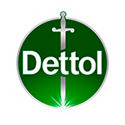
Dettol launched a limited edition of its Dettol Handwash that comes in 100% recycled bottles in India. The bottle carries a “contemporary design” in black with golden inscriptions for highlights. The company said part of proceeds from the sale of each bottle will go to the ASSOCHAM foundation for plastic waste recycling.[Image Credit: © RB plc]
Reckitt Benckiser Reminds Brands To Stop Overselling Their Sustainability Story
 Brands should avoid overselling their sustainability and environment-protection stories, according to Fabrice Beaulieu, RB’s executive vice-president of group marketing and category development organization for the Hygiene business. He said brands should “embrace” it when called out by NGOs and charities with more experience about climate-related issues. Marketers should avoid a tendency to “oversell a story” and instead accept inputs from those with more expertise to come up with “more authentic” campaigns.[Image Credit: © RB plc]
Brands should avoid overselling their sustainability and environment-protection stories, according to Fabrice Beaulieu, RB’s executive vice-president of group marketing and category development organization for the Hygiene business. He said brands should “embrace” it when called out by NGOs and charities with more experience about climate-related issues. Marketers should avoid a tendency to “oversell a story” and instead accept inputs from those with more expertise to come up with “more authentic” campaigns.[Image Credit: © RB plc]
CORPORATE ACTION: Unilever
P&G Announces Refill Initiative Using Aluminum Bottles For Shampoos In Europe
 Procter & Gamble announced its plan to launch in Europe its “good refill system”, a product refill system that offers reusable and refillable aluminum bottles for shampoo. The company expects the system, which also uses a recyclable refill pouch made using 60% less plastic, to start operating in 2021 for its Head & Shoulders, Pantene, Herbal Essences, and Aussie shampoo brands. The refill system will help the company achieve its goal of reducing the use of virgin plastic by 50% in shampoos and conditioners by the end of 2021.[Image Credit: © Proctor & Gamble]
Procter & Gamble announced its plan to launch in Europe its “good refill system”, a product refill system that offers reusable and refillable aluminum bottles for shampoo. The company expects the system, which also uses a recyclable refill pouch made using 60% less plastic, to start operating in 2021 for its Head & Shoulders, Pantene, Herbal Essences, and Aussie shampoo brands. The refill system will help the company achieve its goal of reducing the use of virgin plastic by 50% in shampoos and conditioners by the end of 2021.[Image Credit: © Proctor & Gamble]
P&G Develops Aerosol System With Recyclable Plastic Packaging
 Procter & Gamble’s 100% polymer aerosol system is a finalist in the Pre-Commercialized Innovation category of the 2020 Sustainability Awards. The aerosol system comes in plastic packaging that is 100% recyclable by existing PET recycling infrastructure and does not rust like the metal packaging of those made by rival brands.[Image Credit: © Proctor & Gamble]
Procter & Gamble’s 100% polymer aerosol system is a finalist in the Pre-Commercialized Innovation category of the 2020 Sustainability Awards. The aerosol system comes in plastic packaging that is 100% recyclable by existing PET recycling infrastructure and does not rust like the metal packaging of those made by rival brands.[Image Credit: © Proctor & Gamble]
CORPORATE ACTION: Other
Dow Collaborates With Liby To Launch 100% Recyclable Laundry Packaging In China
Ocean Spray, TerraCycle Launch Free Recycling Program
 The Middleborough, Mass.-based agricultural cooperative says waste management company TerraCycle is launching a free recycling program that enables Ocean Spray customers to recycle flexible plastic Craisins dried cranberries and snack packaging for an alternative use. Participants in the program can send their Craisins flexible plastic packaging to TerraCycle, where the packaging is cleaned and melted into hard plastic that can be remolded into new recycled products, such as park benches and picnic tables. For each shipment of Craisins packaging sent to TerraCycle through the program, participants earn points that can be donated to a non-profit, school or charitable organization of their choice. The cooperative is also working with TerraCycle's new Loop platform to design and launch products in reusable packaging.[Image Credit: © Ocean Spray]
The Middleborough, Mass.-based agricultural cooperative says waste management company TerraCycle is launching a free recycling program that enables Ocean Spray customers to recycle flexible plastic Craisins dried cranberries and snack packaging for an alternative use. Participants in the program can send their Craisins flexible plastic packaging to TerraCycle, where the packaging is cleaned and melted into hard plastic that can be remolded into new recycled products, such as park benches and picnic tables. For each shipment of Craisins packaging sent to TerraCycle through the program, participants earn points that can be donated to a non-profit, school or charitable organization of their choice. The cooperative is also working with TerraCycle's new Loop platform to design and launch products in reusable packaging.[Image Credit: © Ocean Spray]
CAMPAIGNS, COMMITMENTS & NGOs
Boots Introduces Lines Of Earth-Friendly, Affordable Christmas Gifts
 UK retailer Boots is removing single-use plastic packaging from its Christmas gift ranges, a move the company says will eliminate 2,020 tonnes of plastic. Boots, in partnership with BBC Earth, will create a new Christmas gift collection featuring sustainable and affordable products. According to the company, the partnership will save an equivalent of more than 990,000 plastic bottles.[Image Credit: © The Boots Company PLC]
UK retailer Boots is removing single-use plastic packaging from its Christmas gift ranges, a move the company says will eliminate 2,020 tonnes of plastic. Boots, in partnership with BBC Earth, will create a new Christmas gift collection featuring sustainable and affordable products. According to the company, the partnership will save an equivalent of more than 990,000 plastic bottles.[Image Credit: © The Boots Company PLC]
NTCP Calls For Focus On Resources Recovery To Drive Circular Economy
.png&width=125&height=54) Independent plastic recycling development and testing company National Test Centre Circular Plastics proposes an emphasis on recovering potential resources as an integral approach to creating a circular economy. According to NTCP director Martine Brandsma, the packaging and recycling industries need to move beyond responsible and controlled waste disposal systems. NTCP primarily serves companies that sort and separate plastic waste but it also studies waste streams and develops technologies that will improve plastic packaging recycling.[Image Credit: © National Test Centre Circular Plastics ]
Independent plastic recycling development and testing company National Test Centre Circular Plastics proposes an emphasis on recovering potential resources as an integral approach to creating a circular economy. According to NTCP director Martine Brandsma, the packaging and recycling industries need to move beyond responsible and controlled waste disposal systems. NTCP primarily serves companies that sort and separate plastic waste but it also studies waste streams and develops technologies that will improve plastic packaging recycling.[Image Credit: © National Test Centre Circular Plastics ]
Organizations Call For UN Treaty To Promote, Coordinate Push Against Plastic Pollution
 A new report co-authored by the WWF, Ellen MacArthur Foundation, and Boston Consulting Group, claims that 11 million metric tons of plastic find its way into the environment, oceans and other important ecosystems. The corporate manifesto urges the United Nations to adopt a treaty that will coordinate, mandate, and support member states’ policies, rules and regulations regarding plastic pollution ahead of the 5th Session of the United Nations Environmental Assembly. The manifesto is supported by several leading businesses companies. While public awareness of plastic pollution is rising, and with businesses seeing growing pressure on their “social license to operate”, many obstacles to eliminating this problem remain. While a growing number of companies are adopting voluntary initiatives and governments are moving to regulate plastic pollution worldwide, countries need to adopt policies that will focus on the leading drivers of plastic pollution. Also, the lack of baseline data is obstructing efforts to report and track progress, while some countries and regions have no basic waste management and treatment capacities at all. A UN treaty will provide a dedicated global agreement and coordination required to push system change.[Image Credit: © United Nations]
A new report co-authored by the WWF, Ellen MacArthur Foundation, and Boston Consulting Group, claims that 11 million metric tons of plastic find its way into the environment, oceans and other important ecosystems. The corporate manifesto urges the United Nations to adopt a treaty that will coordinate, mandate, and support member states’ policies, rules and regulations regarding plastic pollution ahead of the 5th Session of the United Nations Environmental Assembly. The manifesto is supported by several leading businesses companies. While public awareness of plastic pollution is rising, and with businesses seeing growing pressure on their “social license to operate”, many obstacles to eliminating this problem remain. While a growing number of companies are adopting voluntary initiatives and governments are moving to regulate plastic pollution worldwide, countries need to adopt policies that will focus on the leading drivers of plastic pollution. Also, the lack of baseline data is obstructing efforts to report and track progress, while some countries and regions have no basic waste management and treatment capacities at all. A UN treaty will provide a dedicated global agreement and coordination required to push system change.[Image Credit: © United Nations]
Cosmetics Europe’s Chave Opposes ECHA’s Proposed Microplastics Restriction
 Cosmetics Europe director-general John Chave opposes the European Chemicals Agency’s January 2019 proposal to limit microplastics in products on the European Union and European Economic Area market in concentrations higher than 0.01% “weight by weight.” He says the restriction reflects the agency’s “very narrow view of the cosmetics and personal care industry” and undervalues the sector. The 60-day public consultation period expired on September 1, 2020 and the European Commission and all EU Member States will evaluate ECHA’s proposal, ECHA committees’ support for the proposed restriction, and public comments gathered.[Image Credit: © John Chave, Cosmetics Europe]
Cosmetics Europe director-general John Chave opposes the European Chemicals Agency’s January 2019 proposal to limit microplastics in products on the European Union and European Economic Area market in concentrations higher than 0.01% “weight by weight.” He says the restriction reflects the agency’s “very narrow view of the cosmetics and personal care industry” and undervalues the sector. The 60-day public consultation period expired on September 1, 2020 and the European Commission and all EU Member States will evaluate ECHA’s proposal, ECHA committees’ support for the proposed restriction, and public comments gathered.[Image Credit: © John Chave, Cosmetics Europe]
CONSUMER & PUBLIC OPINION
One Third Of UK Shoppers Worry About Safety Of Buying Loose Groceries
 In the UK, 29% of shoppers said they felt less comfortable buying loose groceries following the outbreak of the Covid pandemic, according to a survey by Harris Interactive. Results of the survey of 1,000 shoppers also revealed that 36% believed sustainable packaging had gained in importance since the pandemic started, while 11% said it decreased in importance. Also, 28% of respondents picked paper packaging as the safest packaging option, while 12% said “no packaging” was their choice and 11% said plastic packaging was the safest.[Image Credit: © Pixabay, stevepb]
In the UK, 29% of shoppers said they felt less comfortable buying loose groceries following the outbreak of the Covid pandemic, according to a survey by Harris Interactive. Results of the survey of 1,000 shoppers also revealed that 36% believed sustainable packaging had gained in importance since the pandemic started, while 11% said it decreased in importance. Also, 28% of respondents picked paper packaging as the safest packaging option, while 12% said “no packaging” was their choice and 11% said plastic packaging was the safest.[Image Credit: © Pixabay, stevepb]
Product Sustainability Drives Purchasing Decisions For Majority Of UK Consumers
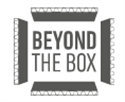 58% of UK adults surveyed by Beyond the Box base their purchasing decision on the material used for the product’s packaging. The cardboard campaign group also found that 55% “actively try to shop sustainably” when buying food products. There are several barriers to sustainable shopping, including cost, with 17% saying they “cannot afford” to shop sustainably, while 23% believe green products are too expensive for most people. Meanwhile, 45% said recycling logos on packaging confuse them; however, 75% said they could be “much more” sustainable if more companies use eco-friendly packaging.[Image Credit: © Beyond the Box ]
58% of UK adults surveyed by Beyond the Box base their purchasing decision on the material used for the product’s packaging. The cardboard campaign group also found that 55% “actively try to shop sustainably” when buying food products. There are several barriers to sustainable shopping, including cost, with 17% saying they “cannot afford” to shop sustainably, while 23% believe green products are too expensive for most people. Meanwhile, 45% said recycling logos on packaging confuse them; however, 75% said they could be “much more” sustainable if more companies use eco-friendly packaging.[Image Credit: © Beyond the Box ]
APR Commends California Governor For Signing Recycled Content Law
 The Association of Plastic Recyclers has praised California Governor Gavin Newsom for signing California Assembly Bill 793. From 2022, the law requires all plastic bottles included in the state’s container redemption program to average at 15% postconsumer resin, rising to 25% in 2025 and 50% in 2030.[Image Credit: © Association of Plastic Recyclers]
The Association of Plastic Recyclers has praised California Governor Gavin Newsom for signing California Assembly Bill 793. From 2022, the law requires all plastic bottles included in the state’s container redemption program to average at 15% postconsumer resin, rising to 25% in 2025 and 50% in 2030.[Image Credit: © Association of Plastic Recyclers]
UK Consumers Want Manufacturers, Sellers To Pay For Recycling
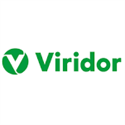 A YouGov survey commissioned by recycling company Viridor found that 64% of UK consumers said businesses producing the product should pay for recycling and 55% want those selling it to pay. Viridor’s 2020 Recycling Index also found that 64% want the UK government to contribute, up from 56% last year, and 67% believe taxpayers are at present paying the recycling bill. 52.5% say they are confused by what plastic can be recycling and the same number want 100% of plastic packaging to be made from recycled material by 2030.[Image Credit: © Viridor]
A YouGov survey commissioned by recycling company Viridor found that 64% of UK consumers said businesses producing the product should pay for recycling and 55% want those selling it to pay. Viridor’s 2020 Recycling Index also found that 64% want the UK government to contribute, up from 56% last year, and 67% believe taxpayers are at present paying the recycling bill. 52.5% say they are confused by what plastic can be recycling and the same number want 100% of plastic packaging to be made from recycled material by 2030.[Image Credit: © Viridor]
POLICY, REGULATION & LEGAL
Unilever Plans To Eliminate Fossil-Fuel-Based Ingredients From Cleaning Products
 Unilever plans to remove fossil-fuel-based materials from the production of its cleaning products by 2030. At present, the use of fossil-fuel-based ingredients accounts for 46% of the carbon footprint of Unilever’s €11 billion Home Care products portfolio. Unilever’s decarbonization plan will have a global impact: more than 1 billion people use its cleaning products each day, which are in 100 billion laundry washes every year. Unilever’s Carbon Rainbow plan includes using “purple”, “grey” and “green carbon”, helping the company avoid a future virgin plastic tax, for example.[Image Credit: © Unilever plc]
Unilever plans to remove fossil-fuel-based materials from the production of its cleaning products by 2030. At present, the use of fossil-fuel-based ingredients accounts for 46% of the carbon footprint of Unilever’s €11 billion Home Care products portfolio. Unilever’s decarbonization plan will have a global impact: more than 1 billion people use its cleaning products each day, which are in 100 billion laundry washes every year. Unilever’s Carbon Rainbow plan includes using “purple”, “grey” and “green carbon”, helping the company avoid a future virgin plastic tax, for example.[Image Credit: © Unilever plc]
BSI Publishes Standard For Measuring Biodegradability Of Polyolefins In UK Packaging
 UK national standards agency BSI (The British Standards Institution) has published the new standard, PAS 9017 Plastics, which measures the biodegradability of polyolefins used in plastic packaging. PAS 9017 Plastics specifies requirements of polyolefins with technology-enhanced open-air terrestrial biodegradability, as well as the chemical analysis and numerical requirements for compliance with the PAS for each testing stage. The standard gives plastic manufacturers the means to get performance data on the biodegradability of polyolefins and gives testing laboratories a standardized protocol to assess polyolefinic materials’ compliance with the standard.[Image Credit: © The British Standards Institution]
UK national standards agency BSI (The British Standards Institution) has published the new standard, PAS 9017 Plastics, which measures the biodegradability of polyolefins used in plastic packaging. PAS 9017 Plastics specifies requirements of polyolefins with technology-enhanced open-air terrestrial biodegradability, as well as the chemical analysis and numerical requirements for compliance with the PAS for each testing stage. The standard gives plastic manufacturers the means to get performance data on the biodegradability of polyolefins and gives testing laboratories a standardized protocol to assess polyolefinic materials’ compliance with the standard.[Image Credit: © The British Standards Institution]
Leading European Cities Join Organization Promoting Circular Economy
INNOVATION & TECHNOLOGY
Coca-Cola Announces Prototype Of Paper Bottle For Packaging
 Coca-Cola said it has developed a first prototype of its proposed paper bottle packaging. The company has partnered with Paboco and three other companies from the Paboco Pioneer Community to develop the paper bottle as part of the company’s World Without Waste sustainability initiative. Coca-Cola is testing the paper bottle in the laboratory to evaluate its performance in the refrigerator and its compliance with existing food packaging safety standards.[Image Credit: © Coca-Cola European Partners]
Coca-Cola said it has developed a first prototype of its proposed paper bottle packaging. The company has partnered with Paboco and three other companies from the Paboco Pioneer Community to develop the paper bottle as part of the company’s World Without Waste sustainability initiative. Coca-Cola is testing the paper bottle in the laboratory to evaluate its performance in the refrigerator and its compliance with existing food packaging safety standards.[Image Credit: © Coca-Cola European Partners]
Recycling Technologies, Neste, Unilever Collaborate To Turn Waste Plastics Into New Packaging
EMERGING IDEAS, THEMES & TRENDS
Fussy Plans To Launch Line Of Plant-Based Refillable Deodorants
 UK startup Fussy will launch a line of refillable plant-based deodorants in January 2021. Fussy deodorants will come in outer casings created by the company with 18 months of research and development and are made from corn-based bioplastic. After consumers choose their Fussy casing, which costs about €8 (£7), they can subscribe to have their refills sent to their doorstep. Fussy refills are priced at €5.50 (£5) each and made with plant-based formulas that include a processed probiotic for odor control.[Image Credit: © fussy]
UK startup Fussy will launch a line of refillable plant-based deodorants in January 2021. Fussy deodorants will come in outer casings created by the company with 18 months of research and development and are made from corn-based bioplastic. After consumers choose their Fussy casing, which costs about €8 (£7), they can subscribe to have their refills sent to their doorstep. Fussy refills are priced at €5.50 (£5) each and made with plant-based formulas that include a processed probiotic for odor control.[Image Credit: © fussy]
Tesco Introduces Food-Grade Packaging Made From Recycled Soft Plastic
RESEARCH
UK Grocery Brands Need To Use More Recyclable Packaging, Reduce Waste
 Analysis by Which? of 89 of the bestselling branded groceries in the UK revealed slightly more than a third came in fully recyclable packaging in household collections and almost 40% came without recycling labels. Also, the study showed Shredded Wheat was the best breakfast cereal brand in terms of recyclability, Cherry Yogurt for yoghurts and potted desserts, Galaxy Smooth bar for chocolate, and Ribena blackcurrant squash for juice drinks and smoothies. Cheese products came with various packaging options, with soft cheese products having good recyclability, while bagged snacks did poorly in general. Brands can improve their packaging’s sustainability by using more recyclable materials, removing non-recyclable packaging components, and adding recycling labels to their packaging.[Image Credit: © Which?]
Analysis by Which? of 89 of the bestselling branded groceries in the UK revealed slightly more than a third came in fully recyclable packaging in household collections and almost 40% came without recycling labels. Also, the study showed Shredded Wheat was the best breakfast cereal brand in terms of recyclability, Cherry Yogurt for yoghurts and potted desserts, Galaxy Smooth bar for chocolate, and Ribena blackcurrant squash for juice drinks and smoothies. Cheese products came with various packaging options, with soft cheese products having good recyclability, while bagged snacks did poorly in general. Brands can improve their packaging’s sustainability by using more recyclable materials, removing non-recyclable packaging components, and adding recycling labels to their packaging.[Image Credit: © Which?]
Amazon’s New Climate Initiative Helps Online Shoppers Find, Buy Sustainable Products
 Amazon announced Climate Pledge Friendly, an initiative to help customers find and shop products that are more sustainable than other items it sells. Climate Pledge Friendly labels will be on over 25,000 products, in grocery, household, beauty, fashion, and personal electronics. Amazon also announced Compact by Design, a part of the initiative that certifies products with more efficient design and sustainable packaging. Compact by Design-certified products include products from Seventh Generation and Mrs. Meyer’s.[Image Credit: © Amazon]
Amazon announced Climate Pledge Friendly, an initiative to help customers find and shop products that are more sustainable than other items it sells. Climate Pledge Friendly labels will be on over 25,000 products, in grocery, household, beauty, fashion, and personal electronics. Amazon also announced Compact by Design, a part of the initiative that certifies products with more efficient design and sustainable packaging. Compact by Design-certified products include products from Seventh Generation and Mrs. Meyer’s.[Image Credit: © Amazon]
Copyright 2026 Business360, Inc.

